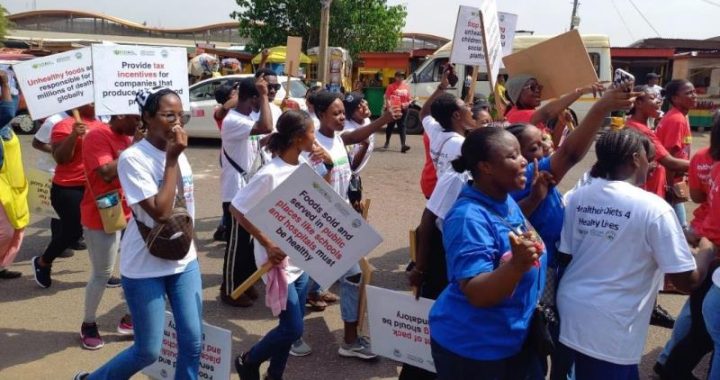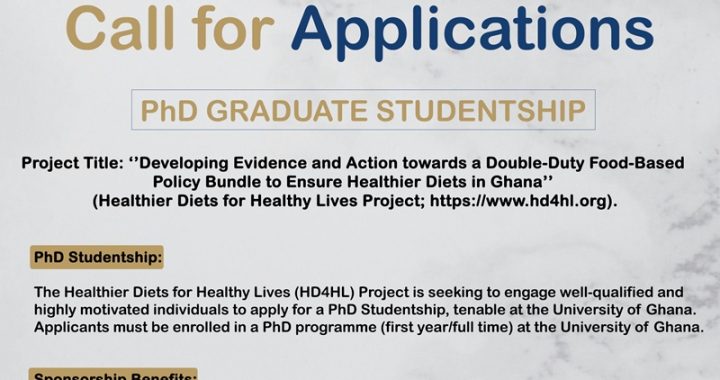The Advocating for Health (A4H) and the Healthier Diets for Healthy Lives (HD4HL) Coalition, comprising academics, researchers, civil society organizations, and partners from government ministries, departments, and agencies have commended the Government of Ghana for the proposal to tax sugar-sweetened beverages (SSBs) as part of the Ghana Excise Duty Amendment Bill, 2022.
The commendation was communicated via a Position Statement signed by the Leader of the Coalition, Professor Amos Laar, and presented to the Presidency, the Parliament of Ghana, the Minister of Finance, and the Ghana Revenue Authority.
According to the coalition, the amended Bill, which seeks, among other things, to tax all sugar-sweetened beverages (SSBs) and some other commodities, is a step in the right direction. The coalition indicates that, the policy has the potential to significantly impact the health of many Ghanaians, given the known link between SSB consumption and diet-related noncommunicable diseases (NCDs) such as obesity, type 2 diabetes mellitus, hypertension, stroke, cardiovascular disease, and some cancers.
The Position Statement reiterated the current state of overweight/obesity prevalence among Ghanaians, which has been on the increase at an alarming rate in both adults and children and is partly driven by the excessive consumption of sugar-sweetened beverages.
“Several local studies report high prevalence of overweight/obesity among Ghanaian children and adults – ranging from 16% to 46% (for children aged 6 – 15 years) and 25% to 47% (for adults aged 15 years or older)”.
The statement cited evidence from a recent survey conducted by the Coalition involving 7,794 participants across the country. Results from the survey show excessive consumption of SSBs among Ghanaians. The results also show that majority (84.3%) of Ghanaians were concerned about obesity and NCDs while expressing their support for any government effort to impose taxes on SSBs or any other food deemed to be harmful to health.
“Data from our survey involving 7,794 residents from all the 16 regions of Ghana show that, 33% of Ghanaians drink SSBs multiple times a week; >10% of the respondents indicated drinking SSBs multiple times a day; nearly 30% of them drink two or more 330mL cans of SSBs at a go28. The survey further reveals that a significant number (84.3%) were concerned about obesity and NCDs (in adults and children).”
The Coalition noted in their statement that this policy decision taken by the Ghana government is a response to the World Health Organization’s recommendation for the usage of food-related health taxes such as SSB taxes as an effective intervention to reduce the consumption of sugars and other foods implicated in obesity and NCDs.
The statement further noted that over 85 countries and jurisdictions have already levied taxes on SSBs with evidence showing a correlation between implementation of the tax and positive dietary behavioral changes, including decreased consumption of SSBs.
“Data from these countries correlate implementation of the tax with positive dietary behavioural changes including decreased consumption of SSBs. The strongest and most consistent effects are seen for a levy on SSBs in the range of 20% to 50%10. Other evidence included in a recent WHO Policy Brief. include positive outcomes such as reduction in purchases and consumption of taxed beverages; increases in purchases and consumption of untaxed beverages, including bottled water; product reformulation to reduce sugar levels; and generation of revenue for governments.”
Aside from commending the Government of Ghana for this policy achievement, the Coalition outlines gaps in the proposed policy, and offers recommendations for the Government of Ghana to strengthen the policy. Among others, they recommend the adoption of a sugar content-based specific excise tax and the earmarking of accrued revenue to health promotion interventions, including health research and supporting social protection programmes such as the National Health Insurance Scheme (NHIS), the Ghana School Feeding Programme (SFP), or the Livelihood Empowerment Against Poverty (LEAP) Programme.
Such arrangements promote tax equity and health equity. The full statement can be found here (https://www.advocating4health.org/position-statement/)
About the Excise Duty (Amendment) Bill, 2022
The Excise Duty (Amendment) Bill, 2022, was presented to the parliament of Ghana on December 15, 2022, by the Deputy Minister of Finance, Mrs. Abena Osei-Asare, and subsequently referred to the Finance Committee of Parliament for consideration.
The Bill seeks to amend the Excise Duty Act 2014 (ACT 878) to include new excisable products as well as revise the excise tax rate upward for some commodities.
Products such as cigarettes and other tobacco products had their excise rates adjusted to align with the Economic Community of West African States (ECOWAS) Protocols. Other commodities, such as malt drinks, alcoholic beverages, and spirits, will see their excise rates raised in order to generate more revenue for the country while mitigating the negative effects of these products. The new products targeted by the Bill include electric cigarettes and other smoking devices and all sweetened beverages, including processed fruit drinks.
Sources: Catholic trends, Metro tv, Original TV, Ghanaweb




